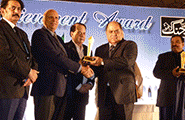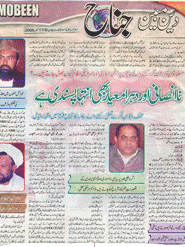Archive for June, 2008
US economic arms involved in economic blackmail
Benazir programme not to provide any real relief to miserable
It’s high time to choose between national and international interest
Government taking from one hand and giving back from other
Government plans to burden masses with an additional Rs 284 billion of expenses and then give back Rs. 34 billion in shape of Benazir Income Support Programme (BISP) and 21 billion in salary and pension relief which is classical example of taking more from one hand and giving back some from the other.
A cut of 112 billion in subsidies has already been announced in the budget and more is to come because of the intense foreign pressure, said Dr. Murtaza Mughal, President of Pakistan Economy Watch in a statement issued here Wednesday.
Government has already started withdrawing subsidies in phases on oil (175 billion), electricity (89 billion) and wheat (20 billion) and its monetary situation will not allow it to resist the demands of World Bank and IMF, known as economic arms of United States of America. read more…
CM should exploit his potential for the welfare of masses
Shahbaz Sharif who had proved his worth during his last term as Chief Minister Punjab should now use his potential and experience for the welfare of masses and not fall prey to political gimmicks, Dr. Murtaza Mughal, Chairman of Pakistan Economy Watch said.
Although Chief Minister Punjab Shahbaz Sharif is no as strong as in his previous term when there was no hindrance like coalition partners etc, he said in a statement issued here Saturday.
But, it is widely believed that his administrative and business skills, developed during his experience family business, can certainly help resolve many issues being faced by helpless masses in the province of Punjab.
Others would be compelled to follow the suit if he proved his significance by working in a way he is known for.
Shahbaz Sharif employed best business practices in his family business and repeated same with some alteration as Chief Minister. “That is why he is remembered with great respect in all circles,” said Mughal. Earlier, the industry and capital use to travel towards Punjab owing to turmoil in Karachi but now the capital is flying abroad, especially Dubai. read more…
Budget deficit control measures seems unrealistic
Shortfall to increase on missed taxation targets, weighty grants
Tax collection of 1.25 trillion rupees, increase in basic sales tax and modified import duties on 300 luxury goods may not prove very effective due to high political, economic and international pressures.
Meeting the deficit target would require drastic efforts which don’t seem realistic in the current circumstances, said Dr. Murtaza Mughal, President of Pakistan Economy Watch in a statement issued here Friday.
Giving Rs 1000 a month to one million poor households and 20 percent increase in the salaries and pensions of government workers will have no significant affect on poor and it seems to be a politically motivated statement.
“Masses will pay dearly for the decisions of the Government to cut oil subsidies and allocations in some important heads,” added Mughal. read more…
Pakistan should avoid selling rice to Philippines
Pakistan should not sell rice to Philippines as it will boost prices at home hitting millions of households, said a statement issued here today.
The Government should impose taxes on exports of the commodity to discourage exports, said Dr. Murtaza Mughal, president of Pakistan Economy Watch.
The Philippines which is the world’s biggest rice importer is in talks with Pakistan and China, broadening a search for supplies beyond Thailand. Islamabad should stop these talks as prices have already surged beyond limits.
Rice futures surged to a record in April after some exporters curbed shipments to guarantee local supplies and the Philippines failed to fill state tenders. The jump, coupled with record energy costs, raised concerns that the world may face food shortages and increased civil unrest. read more…
Internet must be properly policed by Government
High time for Pakistan to ratify Cybercrime Treaty
In the backdrop of increasing incidents of computer-generated intrusions and card frauds, it’s high time for the Government to establish ICT courts dealing with digital investigations and ratify Cybercrime Treaty, said a statement issued here today.
So far, out of 47 signatories, 22 countries have ratified the treaty, introduced seven years ago. FIA is actively perusing the treaty and made good progress in it but more needs to be done, said Dr. Murtaza Mughal, President of Pakistan Economy Watch.
The number of countries that will have ratified the only international treaty addressing cyber crimes is expected to nearly double this year, a sign that momentum is building in the right direction.
He said that Government had issued an Ordinance dealing with cyber crime back in Dec. 2007 and decided to establish ICT courts to deal with the offenders. He demanded proper training for prosecutors and judges by the concerned wing of FIA.
“Many judges have little or no experience handling cyber crime cases since the technology came along far after they were trained,” Mughal informed. read more…
SAARC solid food summit, activation of Food Bank demanded
Food shortages have hit the whole globe and it is high time for SAARC to hold a high profile food summit to address the problem.
The grouping should also bring its Food Bank into operation soon, said Dr. Murtaza Mughal, President of Pakistan Economy Watch.
Four SAARC members including Pakistan, Bangladesh, India and Sri Lanka have already ratified the declaration of the food bank. “Rest four countries that is Nepal, Bhutan, Maldives and Afghanistan, of the regional grouping should ratify the declaration soon,” he said in a statement issued here today.
The decision to develop a food bank for the region was taken in April 2007 at the last summit of the SAARC. In view of the experience of food crisis in the region and other countries of the world since 2007 the decision to develop a food bank for the region was a prudent and farsighted one. The recent experience also has taught that if the decision was taken some years ago and implemented the region would not have suffered such a food crisis.
“It has now become an urgent task for the SAARC to establish the proposed food bank to store the targeted two million tones of cereal rice and wheat,” said Mughal.
Food crisis has not remained confined only to the SAARC region. It has become a global problem for a host of reasons. In that backdrop, the Food and Agricultural Organization (FAO) has warned nations that food price globally will come down only a little and furthermore, very slowly. Hence, all nations of the world, especially the Third World ones have to be very careful.
Analysts and forecasters are one that even if money is available food may not be available in the international market at the time of dire need.
SAARC is a relatively underdeveloped but most populous region in the world. So, accumulation of food grain reserve should be a topmost concern for the member countries.
During the last summit held in India it was thousand times pledged to be more active to protect the interest of the member countries. Now time has come to translate the promise into action.
Political conflicts hitting economy hard
Food scarcity can lead country into real instability
KSE saw biggest decline among 89 global benchmarks
Real instability knocking on doors of Pakistan
Multi dimensional political struggle between President, Pakistan People’s Party and PML-Nawaz as well as movement of lawyers has not only pushed the issues of food scarcity, loadshedding and inflation in the background but also brought the main stock index to its knees.
The efforts of State Bank of Pakistan that include May 23 step of raising its benchmark interest rate to tame inflation are not proving sufficient as inflation remains at a twenty-five year high.
Investors’ confidence is in a nosedive and capital flight has started with an alarming ratio while uncertainty and risk of default has resulted in biggest stock plunge in eight years recently.
Now the rumors about a big change on the political chessboard have added to the worries of investors and business community.
The unending political disputes have not only hurt the economy of Pakistan but also undermined the efforts to improve the living standards of people who according to world bodies are threatened due to food scarcity. “Half of Pakistanis can no longer afford sufficient food,” United Nations recently said.
If the situation remains unaddressed and top politicians remained busy in other issues, it could lead to real instability soon,” said Dr. Murtaza Mughal, President Pakistan Economy Watch. read more…





